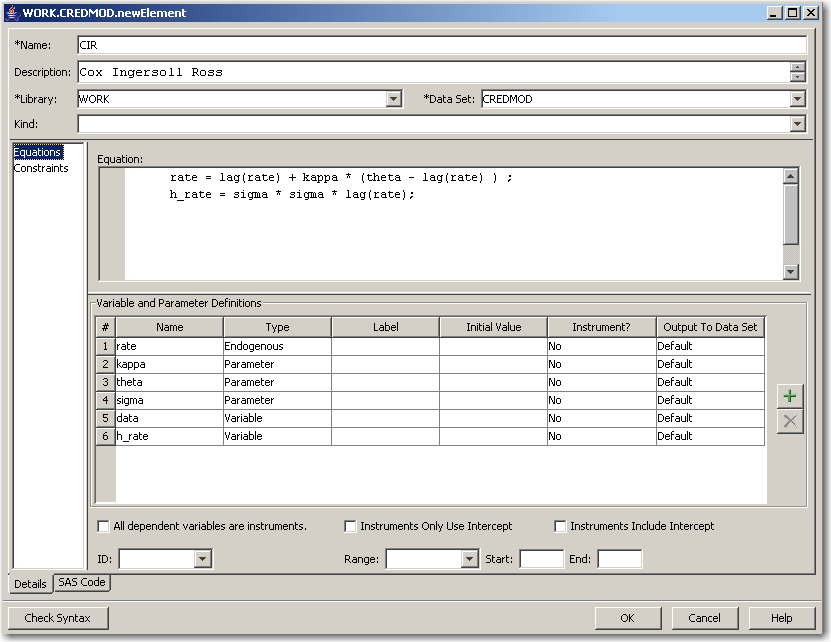| SAS/ETS Model Editor Window Reference |
| Equations Details |
When you select Equations on the Details tab, you can specify the equation for a model and define the variables and parameters for the model.

When Equations is selected on the Details tab, the following controls and fields are displayed:
- Equation:
specifies the equations for the model.- Variable and Parameter Definitions
lists the variables and parameters for the model that is defined in the Equation: field. To add a new row, click the Add button . A new entry appears in the Variable and Parameter Definitions table. To edit the value for an entry, double-click the appropriate cell in the Variable and Parameter Definitions table. To delete an entry, select an existing entry and then click the Delete button
. A new entry appears in the Variable and Parameter Definitions table. To edit the value for an entry, double-click the appropriate cell in the Variable and Parameter Definitions table. To delete an entry, select an existing entry and then click the Delete button  .
. - Name
specifies the name of the variable or parameter.- Type
specifies the variable type (such as endogenous).- Label
specifies the label of the variable or parameter.- Instrument?
specifies whether the variable or parameter is an instrument.- Output To Data Set
specifies the output to data set options. The selections map to the options DROP, KEEP, and OUTVARS of the MODEL procedure.
- All dependent variables are instruments.
indicates whether all of the exogenous variables are to be instrumental variables. (This check box is equivalent to the _EXOG_ option in the INSTRUMENTS statement in the MODEL procedure. See Chapter 18, "The MODEL Procedure" (SAS/ETS User’s Guide), for more information about PROC MODEL.- Instruments Only Use Intercept
indicates whether to include only the intercept in the list to be an instrument variable.- Instruments Include Intercept
indicates whether to include an intercept term and all of the exogenous variables as instrumental variables.- ID
specifies the name of the ID variable to be created for the input data set. You can type any valid SAS variable name in this field or select from the list.- Range:
specifies the time range between observations in the data set. Select a range from list.- Start:
specifies the starting date for the time series in the data set. Enter a date value in this field, using a form that is recognizable as a SAS date informat (for example, 1998:1, feb1997, or 03mar1998).- End:
specifies the ending date for the time series in the data set. Enter a date value in this field, using a form that is recognizable as a SAS date informat (for example, 1998:1, feb1997, or 03mar1998).- SAS Code
provides the SAS statements for the model.- Add button

adds a variable row to the table.- Delete button

removes variable row from the table.- OK
saves the model template.- Cancel
closes the window without implementing any changes.- Help
provides help about this window.
Copyright © SAS Institute, Inc. All Rights Reserved.